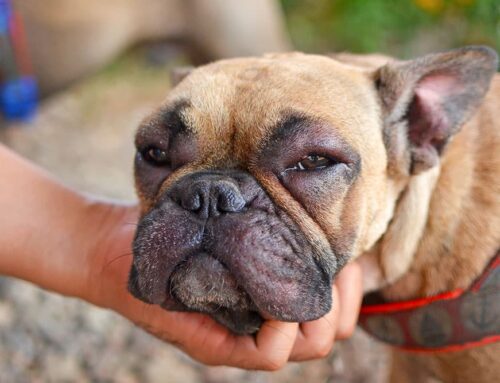Dog Itching That Won’t Stop: How to Spot (and Soothe) Skin Allergies
When your dog can’t stop scratching, licking, or chewing their skin, allergies are often to blame. Whether triggered by food, pollen, or flea bites, these sensitivities can leave pets miserable- and owners frustrated. Red, irritated skin, hair loss, and chronic ear infections are common clues that your dog’s immune system is overreacting to something in their environment. The good news? With the right diagnosis and care, relief is absolutely possible.
At Stack Veterinary Hospital in Syracuse, NY, our team of ten doctors- including board-certified specialists- has been helping pets feel better for more than a century. As an AAHA-accredited practice for 65 consecutive years, we bring together advanced diagnostic tools and individualized treatment plans to manage allergies at their source and restore your dog’s comfort and quality of life.
What Causes Seasonal Allergies in Dogs and Cats
When your dog starts scratching relentlessly every spring or fall, they’re likely experiencing atopic dermatitis, an immune system overreaction to environmental allergens. Unlike food sensitivities, which persist year-round, environmental allergies tend to flare during specific seasons when pollen counts rise or humidity increases.
Common triggers include tree pollen, grass, ragweed, mold spores, and dust mites. Regional climate plays a significant role- warm, damp conditions extend allergy season and create ideal environments for mold growth. In Central New York, spring tree pollen and fall ragweed are particularly troublesome for allergic pets.
Certain breeds carry genetic predispositions to atopic dermatitis. Golden Retrievers, Labrador Retrievers, West Highland White Terriers, Bulldogs, and German Shepherds are among the most commonly affected. While cats can also develop seasonal allergies, they often show symptoms through overgrooming rather than obvious scratching.
Both indoor and outdoor pets can suffer from environmental allergies. Pollen drifts indoors through open windows, clings to clothing, and settles on carpets and furniture. Even pets who rarely venture outside may develop reactions to dust mites or indoor mold.
Regular wellness care helps veterinarians track recurring symptoms and identify seasonal patterns early. Documenting when flare-ups occur- and what environmental factors coincide- provides valuable diagnostic information for developing targeted treatment plans.
Why Untreated Allergies Become Serious Health Problems
Allergies create persistent inflammation that damages skin, disrupts sleep, and increases infection risk. Without treatment, what begins as mild itchiness can spiral into painful, chronic conditions requiring intensive medical intervention.
Skin and Coat Damage
Constant scratching and biting break down the skin’s protective barrier, allowing bacteria and yeast to invade. Dogs develop red, inflamed patches on their bellies, armpits, paws, and faces. Hair loss creates bare spots, and repeated trauma leads to thickened, darkened skin.
Hives may appear suddenly as raised bumps across the body, while excessive paw licking creates deep infections between the toes. “Hot spots”- moist, painful lesions caused by self-trauma- can spread rapidly and require immediate veterinary attention.
Chronic Ear Infections
Allergies frequently trigger ear infections because inflammation creates warm, moist conditions ideal for bacterial and yeast overgrowth. Dogs shake their heads, scratch at their ears, and develop foul-smelling discharge. Left untreated, infections damage the ear canal and can lead to hearing loss.
Repeated head shaking from ear discomfort sometimes causes ear hematomas– painful blood-filled swellings on the ear flap requiring surgical drainage. If your dog experiences recurrent ear problems, underlying allergies are likely the root cause.
Eye and Respiratory Symptoms
Allergic dogs may sneeze, rub their faces, or develop red, watery eyes. Repeated scratching at the face can cause corneal ulcers– painful scratches on the eye’s surface that require immediate treatment to prevent vision loss.
Early diagnosis through comprehensive diagnostics prevents minor allergic reactions from becoming serious complications.
Identifying the Trigger Through Veterinary Diagnosis
Accurate diagnosis begins with a thorough medical history and physical examination. Our veterinarians at Stack Veterinary Hospital review your pet’s symptoms, lifestyle, and environmental exposures to narrow down potential triggers.
Environmental allergies often coexist with food sensitivities or flea allergies, making diagnosis complex. Blood panels and intradermal skin testing identify specific allergens like grasses, weeds, mold, and dust mites. These tests guide treatment decisions and help formulate immunotherapy protocols.
Saliva-based or mail-order allergy tests lack scientific validation and often produce misleading results. Reliable diagnosis requires veterinary-supervised testing and interpretation. Keeping a detailed log of when symptoms worsen- noting weather conditions, seasonal changes, and location- provides valuable diagnostic clues.
Flea Allergy Dermatitis
Flea allergy dermatitis occurs when dogs develop severe reactions to proteins in flea saliva. Even a single flea bite can trigger intense itching, hair loss, and scabbing along the tail base, rump, and inner thighs.
Many allergic dogs groom so obsessively that visible fleas disappear, making diagnosis challenging. Flea dirt- tiny black specks that turn red when moistened- confirms flea exposure. Year-round prevention is essential for allergic pets, as even brief flea contact can cause weeks of misery.
Food Allergies
Elimination diet trials remain the only reliable method for diagnosing food allergies. This process involves feeding a novel protein or hydrolyzed diet exclusively for 8 to 12 weeks, then reintroducing the original diet to confirm whether symptoms return.
Common food allergens include chicken, beef, dairy, and certain grains. Unlike environmental allergies, food sensitivities cause year-round symptoms and often affect the ears, paws, and face. Successful trials require strict adherence- no table scraps, flavored medications, or treats during the testing period.
Proven Treatment Strategies for Lasting Relief
While allergies cannot be cured, consistent management dramatically improves quality of life. Treatment focuses on three goals: reducing allergen exposure, calming inflammation, and supporting skin healing.
Environmental Control Measures
Simple daily habits significantly reduce allergen contact:
- Wipe paws, bellies, and faces with damp cloths after outdoor activities
- Install HEPA air filters to trap indoor allergens
- Keep windows closed during peak pollen hours
- Wash bedding weekly in hot water
- Vacuum frequently using HEPA-filtered vacuums
For severely allergic dogs, protective booties or lightweight body suits prevent direct contact with grass and pollen during walks.
Topical Therapy
Topical treatments remove allergens from the skin’s surface while soothing inflammation. Medicated shampoos, mousses, and wipes provide immediate relief when used consistently.
Bathing twice weekly with a 10-minute lather time allows active ingredients to penetrate the skin. Focus on high-contact areas- paws, armpits, bellies, and facial folds. Regular ear cleaning prevents wax buildup and reduces infection risk.
Professional grooming removes pollen, dander, and loose hair, reducing allergen load. At Stack Veterinary Hospital, our grooming team works closely with our medical staff to provide therapeutic bathing and coat care for allergic pets.
Prescription Medications
Over-the-counter antihistamines provide partial relief for mild cases but rarely control moderate to severe allergies. Prescription medications offer more effective itch control with fewer side effects.
Apoquel and Cytopoint target specific immune pathways causing itchiness, providing rapid relief within hours to days. These medications work well for seasonal flare-ups and can be used long-term when needed.
Immunotherapy– delivered through allergy shots or oral drops- gradually desensitizes the immune system to specific allergens. This approach requires months to show results but offers lasting improvement and reduces medication dependence over time.
For dogs with severe hot spots or chronic inflammation, laser therapy accelerates healing by reducing pain and promoting tissue repair. Our services include therapeutic laser treatments as part of comprehensive allergy management.
Year-Round Parasite Prevention
Consistent flea prevention is non-negotiable for allergic pets. Even indoor dogs in temperate climates require protection, as fleas thrive in heated homes during winter months.
Modern preventives kill fleas before they bite, preventing allergic reactions entirely. Combining flea control with environmental management and medical therapy creates the most effective treatment approach.

Providing Relief for Your Itchy Dog
Accurate diagnosis and consistent management transform allergies from a constant source of misery into a manageable condition. Early intervention prevents secondary infections, reduces treatment costs, and improves your dog’s comfort and happiness.
At Stack Veterinary Hospital, our experienced team combines advanced diagnostics with compassionate care to help allergic pets thrive. Whether your dog needs emergency relief during a severe flare-up or long-term immunotherapy, our comprehensive services provide solutions tailored to their unique needs.
If your dog is scratching, licking, or showing signs of skin irritation, don’t wait for the problem to worsen.
Request an appointment today or contact us to discuss your pet’s symptoms and explore treatment options.







Leave A Comment